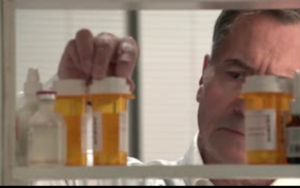Some patients who are diagnosed with hypertension experience dry eyes because certain blood pressure medications may cause dry eyes. I will tell you what to do about dry eyes for instant relief and longterm resolution.
There may be other reasons for dry eyes like a decrease in estrogen in post-menopausal women. Vitamin A and omega 3 deficiency could also cause dry eyes.
Causes of Dry Eyes

Diuretics can cause your eyes to be dry, especially if you are dehydrated. Therefore, it is very important to drink at least four 16 ounces of water every day, unless this is contraindicated to your health (i.e. heart failure). Ask your health care provider about your recommended water intake to be safe.

See a list of common diuretics below:
1) Hydrochlorothiazide HCTZ (Hydrodiuril, Microzide)
2) Chlorothiazide (Diuril)
3) Lasix (Furosemide)
4) Chlorothalidone (Hygroton)
5) Indapamide (Lozol)
6) Torsemide (Demadex)

Beta-blockers may also cause dry eyes. They lower the heart rate and help the heart to rest by reducing the blood volume. Below are the most commonly prescribed beta-blockers:
1) Labetalol (Trandate & Normodyne)
2) Metoprolol (Lopressor & Toprol)
3) Atenolol (Tenormin)
4) Carvedilol (Coreg)
5) Nebivolol (Bystolic)
6) Ziac
Other Causes of Dry Eyes
Eye surgery, hormone replacement, or vitamin A deficiency are other culprits of dry eyes. Certain diseases other than hypertension may cause dry eyes, like shogrens and thyroid disease.
The 2 best things you can do to treat dry eyes are vitamin A replacement if you are deficient and hydration if dehydration is the problem.
View the video below to understand how to treat dry eyes.
Work-up for Dry Eyes
1) Serology for circulation antibodies
2) Schirmer test
Dry Eye Treatment
1) Vitamin A 5000-2500 iu
2) Estrogen replacement
3) Omega 3 supplement
4) Retasis drops (for chronic dry eyes)
5) Surgery (corrects abnormal lids, mucous membrane grafting, salivary gland duct transplantation)